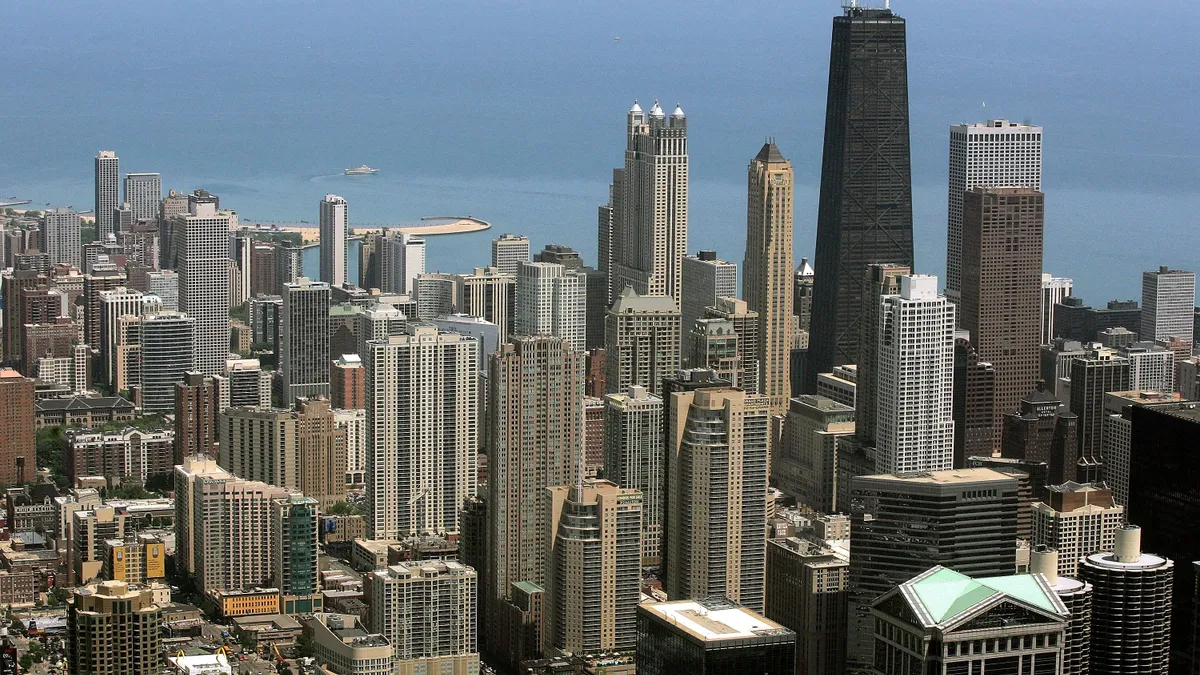Dive Brief:
- A construction worker who fell eight stories and was critically injured on a Chicago jobsite last week has sued Turner Construction and scaffolding subcontractor Adjustable Concrete Construction. The family of another worker killed in the same fall is also planning legal action.
- Ironworker Jeffrey Spyrka and technical engineer David O’Donnell were working on scaffolding at the University of Chicago Cancer Pavilion project on June 6, when winds reached 41 mph, according to weather data. Spyrka suffered critical injuries in the fall but survived. O’Donnell died at the scene.
- Attorney Lou Cairo of GWC Injury Lawyers in Chicago, who is representing Spyrka and has been retained by O’Donnell’s family, said this was avoidable. “These workers should have never been working on what turned out to be an unsafe, dangerous scaffold perched over 100 feet in the air,” Cairo said in a news release shared with Construction Dive. “The evidence will prove that this was a totally preventable catastrophe.”
Dive Insight:
The lawsuit claims Turner and Adjustable Concrete were negligent in allowing work to continue at height even as the wind picked up and the platform separated from the building on its southwest corner. According to local news reports, workers had complained about the stability of the scaffolding earlier in the week.
“Real jobsite safety starts at the top of the food chain in construction where all the financial resources, manpower, site authority and legal responsibility exist; all of which are necessary for the implementation and enforcement of a jobsite safety plan,” Cairo said in an email to Construction Dive.
Work has stopped at the site as the companies and OSHA investigate, Cairo said.
High winds
Weather data shows winds gusts in Chicago started ramping up shortly before 9 a.m. June 6, and reached their highest point at 11:53. The worker falls occurred around noon, according to news reports, which said witnesses saw the scaffolding swaying. It was secured to the building after the fact.
Although OSHA doesn’t require work to stop on temporarily installed structures at a specific wind speed, the Scaffold & Access Industry Association trade group recommends “a competent person should consider stopping work if wind exceeds 25 mph,” depending on the type of scaffolding.
Turner and Adjustable Concrete declined to comment on those details, but provided statements about the fall to Construction Dive.
“The safety and wellbeing of everyone on our sites is so important to us. We work extremely hard to prevent days like this and we have halted all construction activity,” Chris McFadden, a spokesman for New York City-based Turner, wrote in an email to Construction Dive. “We are aware of the court filing, and we continue to fully support investigations underway by all relevant agencies and entities.”
The firm also said it would provide grief counseling to all workers on site going forward.
Eric Lindquist, president of Lombard, Illinois-based Adjustable Concrete, also declined to comment on specifics, but said in an email that the firm was working with Turner and OSHA on an investigation.
“We are aware of the recent filings and continue to be deeply saddened to learn of this accident. We offer our sincerest condolences to the loved ones of those affected. Safety is integral to what we do,” Lindquist wrote. ”We are deeply grateful for the University of Chicago Medical Center doctors and all first responders involved.”
Tethers, fall arrest systems
It’s unclear whether Spyrka or O’Donnell were wearing tethers or harnesses or other types of “fall arrest” equipment as they worked at height on the 575,000-square-foot project, which broke ground in September.
OSHA calls for fall protection, including guardrails and toe-boards, to be in place for construction work performed at an elevation of 6 feet or higher. Safety harnesses and tethers may be required on certain jobs, according to the agency’s website.
Falls are a leading cause of workplace deaths in construction, with 38% of fatalities in the industry attributed to falls, slips and trips in 2022, according to the Bureau of Labor Statistics.
Cairo, the attorney, said he wasn’t aware of any rules that would require a tether or harness on the type of scaffolding used at the University of Chicago Cancer Pavilion site. He said site supervisors and workers didn’t wear this type of fall protection on the scaffold, even as it moved from floor to floor.
Spyrka’s suit seeks more than $200,000 in damages from the companies. Cairo said he intends to file a second lawsuit on behalf of the O’Donnell family this week.












